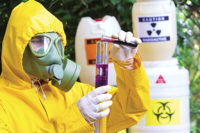 Low respiratory hygiene compliance among health care workers of emergency departments has become a major concern in the spread of respiratory infections. In one study, the objective was to determine the compliance with respiratory hygiene of triage nurses at two university hospital centers and to identify factors influencing compliance to the respiratory hygiene principles of emergency health care workers.
Low respiratory hygiene compliance among health care workers of emergency departments has become a major concern in the spread of respiratory infections. In one study, the objective was to determine the compliance with respiratory hygiene of triage nurses at two university hospital centers and to identify factors influencing compliance to the respiratory hygiene principles of emergency health care workers.
A two-part, cross-sectional, descriptive study was conducted at two training centers. An anonymous observation of compliance with respiratory hygiene by triage emergency nurses was performed. A self-administered, voluntary questionnaire on attitudes, perceptions, and knowledge of respiratory hygiene guidelines was distributed to the health care workers at the emergency department of the two hospital sites.
Median objective compliance with respiratory hygiene measures of triage nurses was 22% (interquartile range [IQR], 11%-33%).
Median perceived compliance of the health care workers was 68% (IQR, 61%-79%).
Median actual knowledge score was 75% (IQR, 75%-100%).
Overall, 91.9% of respondents believed that the mask was an effective preventive measure.
The main obstacles toward mask wearing by the health care worker were “tendency to forget” (37.8%) and “discomfort” (35.1%).
The compliance rate is very low. The study identified a few factors affecting adherence to respiratory hygiene measures that are of potential use in targeting groups and formulating recommendations.




